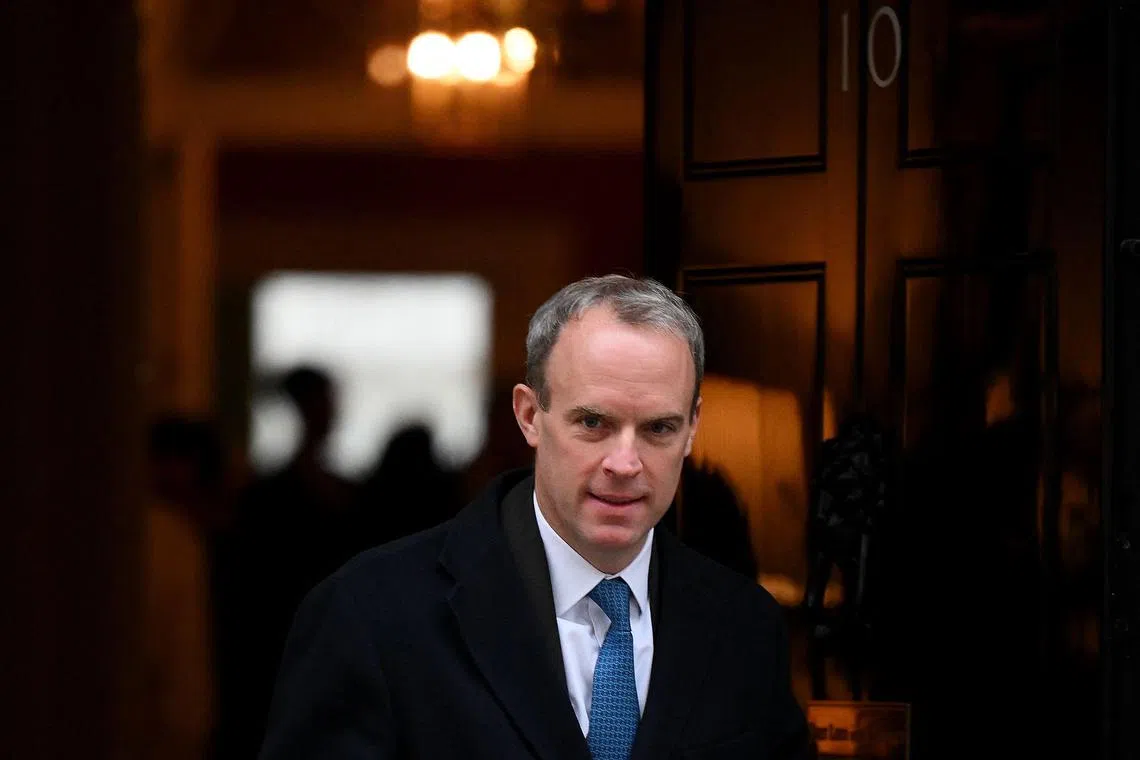UK Deputy Prime Minister Dominic Raab resigns after bullying probe
Sign up now: Get ST's newsletters delivered to your inbox

The departure of Mr Dominic Raab (above) will damage British Prime Minister Rishi Sunak's efforts to revive the governing Conservative Party's fortunes.
PHOTO: AFP
Follow topic:
LONDON – British Deputy Prime Minister Dominic Raab resigned from the government on Friday after an independent investigation into complaints that he bullied colleagues.
It is the latest scandal to force out one of Prime Minister Rishi Sunak’s top ministers.
Mr Raab is the third senior minister to leave in the last six months over issues related to personal conduct.
The departure will damage Mr Sunak’s efforts to revive the governing Conservative Party’s fortunes.
It is also a major embarrassment, as Mr Sunak had entered Downing Street last October
Mr Raab’s resignation comes just two weeks ahead of English local council elections, with Mr Sunak’s Conservatives predicted to fare badly.
The Prime Minister said on Friday that he had accepted his deputy’s resignation and also expressed thanks for his service.
“It is with great sadness that I have accepted your resignation,” he told Mr Raab in a letter.
“But it is clear that there have been shortcomings in the historic process that have negatively affected everyone involved. We should learn from this how to better handle such matters in future.”
As deputy prime minister, Mr Raab had no formal powers but would step in for the Prime Minister if he was away from Parliament or incapacitated.
However, he was a close political ally of Mr Sunak and helped launch his prime ministerial campaign last summer.
“I called for the inquiry and undertook to resign if it made any finding of bullying whatsoever,” Mr Raab’s letter said. “I believe it is important to keep my word.”
The resignation will do little to improve the public perception of Mr Sunak’s government following the scandal-ridden tenure of Mr Boris Johnson Ms Liz Truss, after less than two months.
Dangerous precedent
The months-long investigation into Mr Raab’s behaviour heard evidence from multiple government officials about complaints of bullying in three departments.
The independent report by lawyer Adam Tolley found that Mr Raab had acted in a way that was “intimidating” and “persistently aggressive” while at the Foreign Office.
It said that while at the Justice Ministry, he had gone “further than was necessary or appropriate in delivering critical feedback and also insulting, in the sense of making unconstructive critical comments about the quality of work done”.
“(Mr Raab) has been able to regulate this level of ‘abrasiveness’ since the announcement of the investigation,” Mr Tolley wrote. “He should have altered his approach earlier.”
Mr Raab had requested the investigation last November after formal complaints about his behaviour by government officials.
He said he felt “duty-bound” to accept the outcome of the inquiry but also staunchly defended his conduct.
He said the report, which has not yet been publicly released, had concluded that he had not once sworn or shouted at or physically intimidated anyone in 4½ years, and had dismissed all but two of the claims against him.
Mr Raab said setting the threshold so low for bullying “set a dangerous precedent for the conduct of good government”.
This will “have a chilling effect on those driving change on behalf of your government – and ultimately the British people”, he said in his resignation letter to the Prime Minister.
Mr Raab referred to the two incidents where there was a finding of bullying against him – one at the Foreign Office in dealing with a senior diplomat’s handling of the Brexit negotiation over Gibraltar, and one where he gave critical feedback during an earlier stint at the Ministry of Justice from 2021 to 2022.
Mr Keir Starmer, leader of the main opposition Labour Party, accused Mr Sunak of “weakness” for letting his deputy resign rather than sack him.
Another of Mr Sunak’s senior ministers, Mr Gavin Williamson, was forced to resign
The Prime Minister also sacked Conservative Party chair Nadhim Zahawi
Mr Sunak is facing his own investigation by Parliament’s standards watchdog into his behaviour concerning whether he properly declared his wife’s shareholding in a childcare company
The son of a Czech-born Jewish refugee who fled the Nazis in 1938, Mr Raab studied law at Oxford University before becoming a lawyer working on project finance, international litigation and competition law.
He became a Member of Parliament in 2010 and has had several senior ministerial jobs.
Mr Raab was one of the most prominent figures in Britain’s protracted and divisive process to leave the European Union, serving as Brexit minister under former premier Theresa May.
He quit after just three months in November 2018, in protest at Mrs May’s doomed divorce deal with Brussels, which he said offered too many concessions.
When Mr Johnson became Conservative party leader and prime minister after Mrs May’s resignation in July 2019, Mr Raab was catapulted back into government.
Mr Raab had ambitions himself for the top job, challenging Mr Johnson for the Tory leadership after Mrs May quit.
But he trailed in sixth in the leadership contest after a stuttering campaign that was marked by rows over his past views on militant feminism.
His spell in the Brexit ministry also floundered, and was notable for his admission that he “hadn’t quite understood” the economic importance of the port in Dover. AFP, REUTERS

